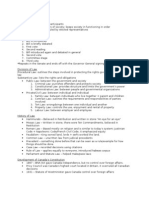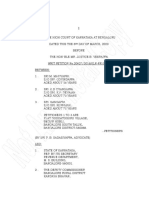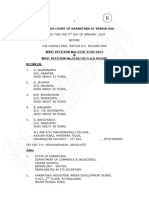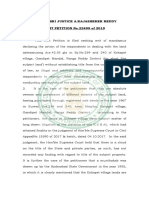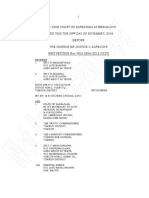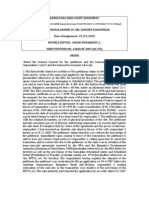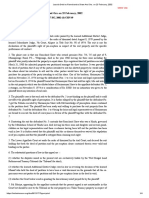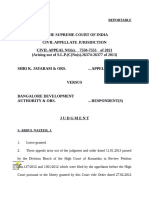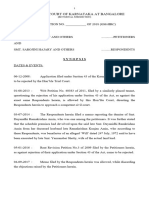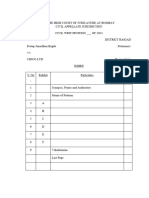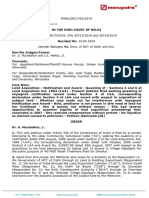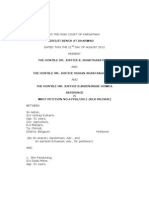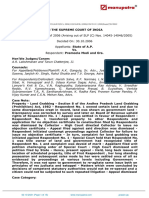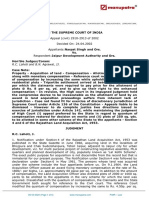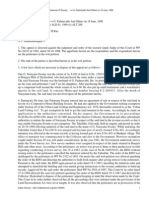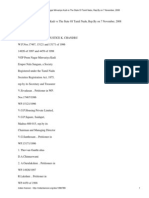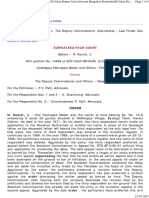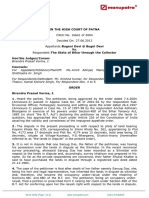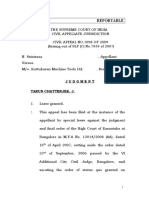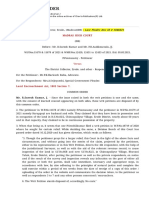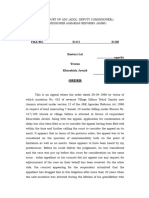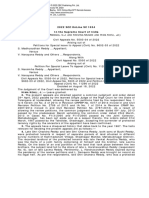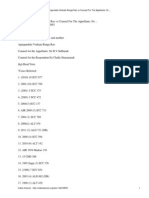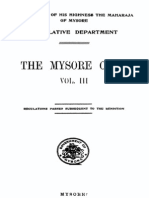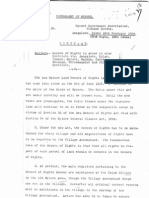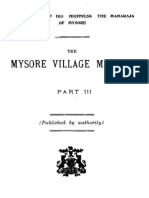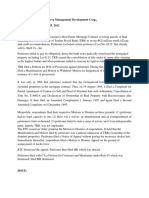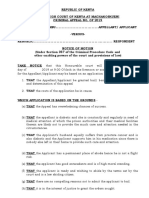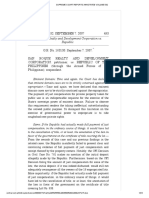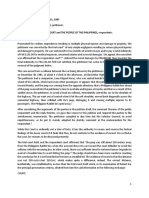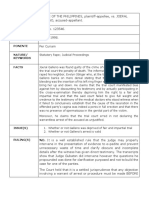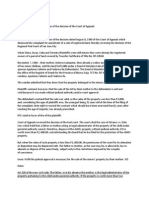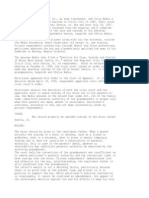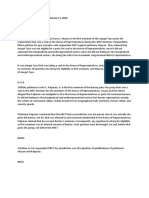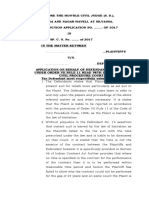Karnataka High Court Order
Karnataka High Court Order
Uploaded by
Umesh HbCopyright:
Available Formats
Karnataka High Court Order
Karnataka High Court Order
Uploaded by
Umesh HbOriginal Description:
Original Title
Copyright
Available Formats
Share this document
Did you find this document useful?
Is this content inappropriate?
Copyright:
Available Formats
Karnataka High Court Order
Karnataka High Court Order
Uploaded by
Umesh HbCopyright:
Available Formats
S.K.
Ravi Shankar vs State Of Karnataka And Others on 13 January, 2000
Karnataka High Court Karnataka High Court S.K. Ravi Shankar vs State Of Karnataka And Others on 13 January, 2000 Equivalent citations: ILR 2000 KAR 1786, 2001 (1) KarLJ 162 Bench: H N Tilhari ORDER 1. By these petitions under Article 226 of the Constitution of India, the petitioner has prayed for the following reliefs viz., (a) For issue of a writ of certiorari and for quashing the order dated 5-7-1993 passed by the Tahsildar, Bangalore North Taluk, Bangalore, in Case No. HOA 46/87-88, insofar as it regrants half lands to respondents 4 to 6 and also for quashing the judgment dated 5-7-1996 passed by the II Additional District and Sessions Judge, Bangalore Rural District. Bangalore, in M.A. No. 69 of 1993 (Annexure-C). (b) Direction to regrant of all the lands claimed by the petitioner by himself exclusively. (c) Grant any other orders deemed fit in the interest of justice. 2. The facts of the case in nutshell are: That after the coming into force of the Karnataka Village Offices Abolition Act, 1961, an application under Section 6 of the said Act, was moved by respondents 4 to 6 claiming for the regrant of the resumed land alleging that the present respondents 4 to 6 i.e., the applicants, in the application, who are authorised holders of the land and they are prepared to deposit the occupancy price and it was originally numbered as Case No. VOA(s) 100/68-69. Objections were filed on behalf of the petitioner challenging the right of respondents 4 to 6 in the matter of regrant of the land. The petitioner denied the right of the present respondents 4 to 6 to the grant of land and asserted that respondents 4 to 6 i.e., the applicants were not the authorised holders within the purview of Section 6 read with Section 2(b) of the Karnataka Village Offices Abolition Act, 1961. There is no dispute that, so far as the present petitioner is concerned, the land was originally granted to his great-grandfather by the Chief Court of Mysore. As regards the village office of Barawardar even in the records at the time of the proceedings, the name of the petitioner was recorded as holder of the office i.e., as Barawardar. On that basis, the petitioner claimed to be entitled to the regrant and not the respondents 4 to 6. There were many pleas taken, but there is no need to go in detail. 3. By order dated 26-6-1972, the land was regranted in favour of the present respondents 4 to 6. The matter had gone up in appeal. The order of the Tahsildar was set aside by the Appellate Authority in M.A. No. 26 of 1974 and the matter was remanded by the District Judge to the Assistant Commissioner for fresh disposal according to law. After the remand, the Tahsildar passed the order on 20th May, 1983 again making regrant in favour of respondents 4 to 6 and rejected the case of the present petitioner. Being aggrieved by that order, the petitioner preferred an appeal before the District Judge, in M.A. No. 25 of 1983 which was dismissed by the District Judge, Bangalore Rural by his order dated 15-9-1987. Feeling aggrieved by the order passed by the District Judge on 15-9-1987, the present petitioner preferred the revision before the Hon'ble High Court in C.R.P. No. 4876 of 1987 which was allowed by this Court vide the order dated 24-6-1991 and remanded the matter to the Tahsildar again for fresh enquiry. After the remand, the Tahsildar passed the order on 5-7-1993. The Tahsildar held that the present petitioner to be Barawardar and thereafter he passed the order dividing the land in question into two shares. Half share was given to the petitioner being Barawardar and the other half share was given to the present respondents 4 to 6 as authorised holders. The petitioner felt aggrieved by this order as well as the present respondents 4 to 6 felt aggrieved by the decision of the Tahsildar to divide the property among the warring groups in this litigation. The petitioner's appeal was numbered as M.A. No. 69 of 1993, while the appeal filed by the present respondents 4 to 6, who claim to be authorised holders was numbered as M.A. No. 46 of 1993. The District Judge heard the matter and allowed the appeal filed by the
Indian Kanoon - http://indiankanoon.org/doc/1497979/ 1
S.K. Ravi Shankar vs State Of Karnataka And Others on 13 January, 2000
present respondents 4 to 6 and dismissed the appeal filed by the present petitioner. It is ordered that the respondents in M.A. No. 69 of 1993 namely the appellants in M.A. No, 46 of 1993 are entitled to re-grant of the entire land in question. The order of the Appellate Court is dated 5-7-1996. Feeling aggrieved by the said order of the II Additional District and Sessions Judge, Bangalore Rural District, Bangalore, the holder of the village office viz., Sri S.K. Ravi Shankar has filed the two writ petitions challenging that order. No doubt, the proceedings being one, two sides of the parties filed the two appeals, but the appellate order being one, one writ petition would have been enough. Anyway, to avoid the complication, the petitioner has filed the two writ petitions challenging the order of the Tahsildar, Bangalore North Taluk, Bangalore, as well as the judgment passed by the II Additional District and Sessions Judge, Bangalore Rural District, Bangalore. 4. It has been contended on behalf of the petitioner that the application under Section 6 of the Karnataka Village Offices Abolition Act, 1961, moved on behalf of the present respondents 4 to 6 was not maintainable as they were not authorised holders. It was further contended that in view of Section 5 of the Mysore Village Offices Act, 1908 (Mysore Act No. IV of 1908), respondents 4 to 6 could be said to have been in possession of the land which form part of the emoluments under the definition of "Emoluments" in the Act. The same was not liable to be transferred, partitioned, or encumbered in any manner whatsoever, and its transfer etc., shall not be lawful, as there was bar against transfer and partition of the emoluments of the village office which include landed property. That emoluments as per the definition of the Act could not be transferred, partitioned or encumbered. The transfer thereof whatsoever was illegal, null and void and respondents 4 t6 6 could not be said to be authorised holders of the land within the framework of the expression "authorised holder" as defined in Section 2(b) read with Section 6 of the Karnataka Village Offices Abolition Act, 1961 (Karnataka Act No. 14 of 1961). The learned Counsel for the petitioner contended that this material aspect of the matter has not been considered by either of the two authorities and without applying their mind to this aspect of the matter the order of regrant has been passed. So, it is illegal, null and void and it should be quashed. 5. The above contentions of the learned Counsel for the petitioner has hotly been contested by Sri H.S. Shankaranarayan, learned Counsel appearing for the respondents 4 to 6. 6. It has been contended by the learned Counsel for respondents 4 to 6 that the transfer deed has never been challenged earlier before the Civil Court. He further contended that the case of respondents 4 to 6 is covered by Section 5 of the Mysore Act No. IV of 1908 viz., the Mysore Village Offices Act, 1908 and it makes distinction between land assigned as the emoluments of the holder of the village office and the land not assigned as emoluments. He contended that under proviso to Section 5 of the Mysore Act No. IV of 1908 the lands which are not assigned as emoluments to the holder of a village office under rules framed under Section 22, nothing contained in this section shall be deemed to affect transfers, partitions or encumbrances, as between different members of a holder's family. The main provision of Section 5 will not apply. The learned Counsel contended that there was an important question to be considered whether the land in question had been granted as part of emoluments to the holder of village office. He further contended that this issue was not framed and decided by any of the authorities. It has not been shown by the petitioner that the land was assigned to the petitioner as part of emoluments as holder of the village office. When this plea was not pressed and it should not be allowed to be raised. The learned Counsel for the respondents 4 to 6 contended that in view of Section 12 of the Karnataka Village Offices Abolition Act, 1961 the old Act viz., the Mysore Village Offices Act, 1908 has been repealed in whole. So that point was not required to be considered as the Mysore Act No. IV of 1908 will not govern the present position. In view of sub-section (3Xa) of Section 12 of the Karnataka Village Offices Abolition Act, 1961 those transactions cannot now be challenged in proceedings under this Act. 7. I have applied my mind to the contentions raised by the learned Counsels appearing for the parties. 8. As regards the repeal of the Mysore Village Offices Act, 1908, the repeal is prospective as per the language of Section 12(1) of the Karnataka Village Offices Abolition Act, 1961. Sub-section (1) of Section 12 of the
Indian Kanoon - http://indiankanoon.org/doc/1497979/ 2
S.K. Ravi Shankar vs State Of Karnataka And Others on 13 January, 2000
Act reads as under: "12. Repeal and savings.-(1) The enactments specified in Schedule I and any existing law relating to village offices in force in any area of the State of Karnataka so far as they apply to village offices or to emoluments attached to such offices are hereby repealed". Sub-section (2) of Section 12 of the Act is not relevant. Sub-section (3) of Section 12 of the Act reads as under: "(3) Nothing in sub-sections (1) and (2) shall be deemed to effect.(a) any obligation or liability already incurred by the holder of a village office or other person before the appointed date; (b) any proceeding or remedy in respect of such obligation or liability and any such proceeding may be continued or any such remedy may be enforced as if this Act had not been passed". 9. A reading of sub-section (3) of Section 12 of the Act, on which reliance has been placed only, deals with the obligation or liability already incurred by the holder of a village office or other person before the appointed date shall not be deemed to be affected. The transaction of sale or transfer cannot be said to come within the purview of the obligation or liability already incurred by the holder of a village office. In this view of the matter, in my opinion, the contention raised on the basis of Section 12 of the Karnataka Village Offices Abolition Act, 1961 that his rights under the sale deed are saved because of sub-section (3)(a) of Section 12 of the Act, is without substance. Repeal being prospective and not retrospective, the provisions of law operating on the date of the partition, transfer or encumbrance will always play an effective role in the determination of the question whether the alleged transfer or partition were validly made in order to determine the question whether a person is authorised holder or not within the purview of Section 6 read' with Section 2(1)(b) of the Karnataka Village Offices Abolition Act, 1961 (Karnataka Act No. 14 of 1961). No doubt, this section provides for regrant of land in favour of the authorised holder, and it is to be seen who is an authorised holder under Section 2(1)(b) of the Karnataka Act No. 14 of 1961. The said section reads as under: " "Authorised holder" means a person in whose favour a land granted or continued in respect of, or annexed to a village office by the State or a part thereof has been validly alienated permanently, whether by sale, gift, partition or otherwise, under the existing law relating to such village officer". 10. Therefore, in order to determine whether respondents 4 to 6 are authorised holders or unauthorised holders, the question whether there has been a valid transfer made in favour of respondents 4 to 6 as claimed or the sale deeds are previous transaction of partition were null and void. Such question has to be determined taking into consideration the law existing at the time the transaction was made with reference to the village office. To that extent, the provisions of the Mysore Act No. IV of 1908 (The Mysore Village Offices Act, 1908), cannot be said to have been repealed or stood repealed. Those provisions are very material. Section 5 of the Mysore Act No. IV of 1908 reads as under: "5. The emoluments of village offices, whether such offices be or be not hereditary, shall not be liable to be transferred, partitioned, or encumbered in any manner whatsoever, and it shall not be lawful for any Court to attach or sell such emoluments or any portion thereof: Provided that in the case of lands which are not assigned as emoluments to the holder of a village office under rules framed under Section 22, nothing contained in this section shall be deemed to affect transfers, partitions or encumbrances, as between different members of a hakdar's family".
Indian Kanoon - http://indiankanoon.org/doc/1497979/ 3
S.K. Ravi Shankar vs State Of Karnataka And Others on 13 January, 2000
11. Before I proceed to discuss Section 5 of Mysore Act No. IV of 1908, it appears proper to refer to the definition clause which defines emoluments under Section 2(e) of the Karnataka Village Offices Abolition Act, 1961 as under: "2(e) "Emoluments" means.(i) land; (ii) assignment of revenue payable in respect of lands; (iii) fees in money or agricultural produce; (iv) money, salaries and all other kinds of remuneration granted or continued in respect of or annexed to, any village office, by the State". 12. This definition is illustrative. Emoluments of village office may include all those which are annexed to the village office, by the State. A reading of Section 5 of the Mysore Act No. IV of 1908, no doubt, creates bar against alienation of items which can be included and which are included within the definition of the emoluments which may include the land also. So, the emoluments of the village office are attached to the village office irrespective of such office be heritable or not. Section 5 of the Mysore Act No. IV of 1908 provides that the items covered by the expression emoluments of the village office shall not be transferable, nor can they be subjected to encumbrance, nor they be transferred, partitioned in any manner, nor the Civil Court is entitled to attach such emoluments, in whatever form they may be, or any portion thereof in execution of any decree. This section bars all sort of alienation of items which are covered by the expression emoluments of the village office. Neither they can be transferred by sale etc., nor can those items which come within the purview of the emoluments be partitioned, nor encumbered in any manner. To this principal section a proviso has been added. Here, the proviso appears to have carved out something which could be covered by the main section and it may instead operate as exception. Exception has been made with respect to all lands which are alleged and shown as not to have been assigned to the holder of the village office as emoluments or part of the emoluments. The expression emoluments of the village office appears to include in itself the emoluments which are given or assigned to the holder of a village office, but the land which is not assigned as part of emoluments of a holder of the village office under Section 22 and the rules made thereunder. The proviso provides that the main clause will not apply to transfer, partition or encumbrance made on such lands inter se members of the holder's family. The same view appears to have been expressed in an earlier decision of this Court by the Hon'ble Justice Mallappa in the case of Sakamma v Ckikkannagowda. 13. In the present case, both the learned Counsels have been very fair and stated on this aspect of the matter that there is no finding on the question whether the lands which are claimed to have been transferred and partitioned, were not assigned as emoluments to a holder of village office. 14. The learned Counsel for the respondents 4 to 6, no doubt, contended that it was for the petitioner to allege and assert and produce evidence or to press it. I am unable to accept this contention. A person who claims benefit of exception clause to the main principal section, the burden lies on him to establish that his case is covered by exception clause and he has to establish the necessary ingredients after having pleaded that case and then evidence has to be led by the parties, but the burden lies on the person claiming benefit of exception to the main principal clause or section. It is also well-settled that after both the parties have led their evidence on that point, the burden of proof loses its importance to a greater extent and then the Court has to determine the question of fact after appreciating the evidence. Therefore, in my opinion when respondents 4 to 6 claim the benefit of the alleged transfer and partition in their favour, the burden did lie on respondents 4 to 6 to allege and establish that those transactions were not affected by Section 5 of, the Mysore Act No. IV of 1908 and were covered by the proviso. In such a case the parties need to be given opportunity for adducing the evidence and to establish the facts. Considering this aspect of the matter, in my opinion the orders impugned
Indian Kanoon - http://indiankanoon.org/doc/1497979/ 4
S.K. Ravi Shankar vs State Of Karnataka And Others on 13 January, 2000
suffer from error of law apparent on the fact of the record and of jurisdiction. 15. For passing the regrant order in favour of respondents 4 to 6 the authorities were required by law to consider the question whether respondents 4 to 6 were authorised holders within the framework of Section 2(1)(b) of the Karnataka Village Offices Abolition Act, 1961 and were entitled to get benefit of Section 6 read with Section 2(1)(b) of the Act. Then in that case no application would be necessary on behalf of the petitioner for regrant under Section 5 of the Mysore Act No. IV of 1908, because of the language of Section 5 itself, and the land which was resumed under Section 3, in a case not falling under Sections 6 and 7 was to be granted to the person who has been a holder of the village office, if he had established all the necessary conditions. So till the application under Section 6 of the Karnataka Village Offices Abolition Act, is disposed of or till it is found that respondents 4 to 6 are not authorities/holders, no application could be made by the present petitioner under Section 4. It is after that decision, it would be open to the petitioner to apply for the regrant or his application for regrant may be considered after the decision on the question whether respondents 4 to 6 are authorised holders or unauthorised holders. Earlier to that such a land which is covered by Section 6 or 7, the application for regrant in favour of a holder of the village office cannot be considered. 16. The writ petitions, as such, are hereby allowed. 17. The order passed by the Tahsildar, Bangalore North Taluk, Bangalore, on 5-7-1993 (Annexure-B) and judgment passed by the II Additional District and Sessions Judge, Bangalore Rural District, Bangalore, on 5-7-1996 (Annexure-D) are quashed. 18. The Tahsildar, Bangalore North Taluk, Bangalore, is hereby directed to proceed afresh taking into consideration the pleas that have been raised or may be raised before it keeping in view the following questions: (1) Whether the present respondents 4 to 6 are authorised holders of the lands within the purview of Section 6 read with Section 2(1)(b) of the Karnataka Village Offices Abolition Act, 1961? (2) Whether the transfer and partition alleged by respondents 4 to 6 have been validly made or hit by Section 5 of the Mysore Village Offices Act, 1908 (Mysore Act No. IV of 1908)? (3) Whether the lands in question were not assigned as part of emoluments to the holder of a village office? (4) Whether the lands in question which vested in the Government and for regrant of which the application had been made by respondents 4 to 6 have been the lands which can be said to be the lands not assigned as emoluments to the holder of the village office under the rules framed thereunder? 19. The Tahsildar to decide the matter afresh after giving opportunity to both the parties to lead evidence on the above questions only and pass the order on the basis of the material placed on record as well as the additional evidence or material produced by both the parties. 20. As the matter is very old having commenced in 1968-69, the Tahsildar is directed to decide the matter expeditiously and in every case within a period of twelve months from the date of the communication of this order or direction. 21. The date for appearance of the parties before the Tahsildar will be fixed later on when the copy of this order becomes available to the parties and they move application for this purpose.
Indian Kanoon - http://indiankanoon.org/doc/1497979/
You might also like
- The Karnataka Registration ManualDocument89 pagesThe Karnataka Registration ManualUmesh HbNo ratings yet
- Bombay Land Revenue ManualDocument968 pagesBombay Land Revenue ManualUmesh Hb100% (2)
- CLU 3M0 NotesDocument26 pagesCLU 3M0 NotesJaejoongie-love100% (1)
- Affidavit of Lost Pawnshop ReceiptDocument1 pageAffidavit of Lost Pawnshop Receiptjoshboracay89% (9)
- In The High Court of Karnataka at BengaluruDocument43 pagesIn The High Court of Karnataka at BengaluruManjunath DasappaNo ratings yet
- CounselsDocument6 pagesCounselsrakesh sharmaNo ratings yet
- ADL-Sri Sambhu Charan Ghosh Mallick Vs State of West Bengal & Ors On 20 December, 2022Document9 pagesADL-Sri Sambhu Charan Ghosh Mallick Vs State of West Bengal & Ors On 20 December, 2022suvonandy1993No ratings yet
- Sadashivaiah and Ors. Vs State of Karnataka and Ors. On 26 August, 2003Document12 pagesSadashivaiah and Ors. Vs State of Karnataka and Ors. On 26 August, 2003Manjunath ShadakshariNo ratings yet
- Display PDFDocument11 pagesDisplay PDFarunkumar45893No ratings yet
- Sri M Mariyappa Vs State of Karnataka On 6 March 2020Document20 pagesSri M Mariyappa Vs State of Karnataka On 6 March 2020Sowmya JogimuttNo ratings yet
- D Ramanatha Reddy and Ors Vs The State of KarnatakKA202006022016254891COM463052Document11 pagesD Ramanatha Reddy and Ors Vs The State of KarnatakKA202006022016254891COM463052Karan YadavNo ratings yet
- WP3536 15 09 01 2018Document88 pagesWP3536 15 09 01 2018Jayaprakash DarabareNo ratings yet
- Ramaiah Vs State of Karnataka On 3 January, 1995Document4 pagesRamaiah Vs State of Karnataka On 3 January, 1995njsanjayNo ratings yet
- (2014) 2 Kar. L.J. 570 in The High Court of Karnataka at BangaloreDocument7 pages(2014) 2 Kar. L.J. 570 in The High Court of Karnataka at BangaloresunilsilentNo ratings yet
- Hon'Ble Sri Justice A.Rajasheker Reddy WRIT PETITION No.22499 of 2019 OrderDocument21 pagesHon'Ble Sri Justice A.Rajasheker Reddy WRIT PETITION No.22499 of 2019 OrderFarha NaazNo ratings yet
- WP2953 12 29 11 2018Document26 pagesWP2953 12 29 11 2018Preetha PNo ratings yet
- Andhra High Court - Raidurg Cooperative SocietyDocument20 pagesAndhra High Court - Raidurg Cooperative SocietyRavi Prasad GarimellaNo ratings yet
- PTCL Act Does Not Apply To Granted Sites of BdaDocument5 pagesPTCL Act Does Not Apply To Granted Sites of BdaSridhara babu. N - ಶ್ರೀಧರ ಬಾಬು. ಎನ್100% (2)
- Shahida Parveen (164 Land Revenue)Document9 pagesShahida Parveen (164 Land Revenue)api-3745637No ratings yet
- Jasoda Debi Vs Ramchandra Shaw and Ors. On 25 February, 2002Document4 pagesJasoda Debi Vs Ramchandra Shaw and Ors. On 25 February, 2002srivani217No ratings yet
- K. Jayaram v. Bangalore Development Authority On December 8, 2021Document14 pagesK. Jayaram v. Bangalore Development Authority On December 8, 20218.7M ViewsNo ratings yet
- Shri K Jayaram Ors Vs Bangalore Development Authority 405598Document14 pagesShri K Jayaram Ors Vs Bangalore Development Authority 405598iraisa consultingNo ratings yet
- Sabbavarapu Appanna Vs The Revenue Divisional OfficerDocument9 pagesSabbavarapu Appanna Vs The Revenue Divisional OfficerBhaskar ReddyNo ratings yet
- WP30246 12 13 02 2014 PDFDocument18 pagesWP30246 12 13 02 2014 PDFManu DcNo ratings yet
- Cancellation of Sale DeedsDocument6 pagesCancellation of Sale DeedsNagaraja Rao MukhiralaNo ratings yet
- Prema Poojary RRPDocument11 pagesPrema Poojary RRPvarshaNo ratings yet
- Writ Petition - v2Document33 pagesWrit Petition - v2NIKUNJ RAVALNo ratings yet
- Rajendra Estate Vs GNIDA - Supreme Court Civil Appeal August 2013Document8 pagesRajendra Estate Vs GNIDA - Supreme Court Civil Appeal August 2013rishi15081975No ratings yet
- Jatinder Badoghu Vs Govt of NCT of Delhi and Ors 1DE201924051916185397COM205633Document6 pagesJatinder Badoghu Vs Govt of NCT of Delhi and Ors 1DE201924051916185397COM205633Tanishq VermaNo ratings yet
- Revision ApplicationDocument8 pagesRevision ApplicationTusharNo ratings yet
- Assistant Commissioner Order Is Subjected To Revision Before Deputy Commissioner Under Karnataka Land Revenue Act 2012 Wp-67926-2011Document62 pagesAssistant Commissioner Order Is Subjected To Revision Before Deputy Commissioner Under Karnataka Land Revenue Act 2012 Wp-67926-2011Sridhara babu. N - ಶ್ರೀಧರ ಬಾಬು. ಎನ್67% (3)
- State of AP Vs Prameela Modi and Ors 30102006 SS060831COM36925Document15 pagesState of AP Vs Prameela Modi and Ors 30102006 SS060831COM36925Prasen GundavaramNo ratings yet
- Lahore High Court,: JudgmentDocument4 pagesLahore High Court,: Judgmentco.dsjbhakkarNo ratings yet
- OWP Madan Lal Vs U.T & Ors New WritDocument19 pagesOWP Madan Lal Vs U.T & Ors New WritahtshamNo ratings yet
- K. Pavan Raj vs. The Municipal Corporation of Hyderabad and Ors.Document7 pagesK. Pavan Raj vs. The Municipal Corporation of Hyderabad and Ors.CHALAMALLA LOKESH REDDYNo ratings yet
- CC 2511-24 Counter Affidavit in WP 5122-202finalDocument11 pagesCC 2511-24 Counter Affidavit in WP 5122-202finalakiveedunagarapanchayatNo ratings yet
- Signature Not Verified: Digitally Signed by Narendra Prasad Date: 2019.08.08 17:05:20 IST ReasonDocument18 pagesSignature Not Verified: Digitally Signed by Narendra Prasad Date: 2019.08.08 17:05:20 IST ReasonAmit JainNo ratings yet
- Wrong Entry No Confer Right and TitleDocument3 pagesWrong Entry No Confer Right and TitleadvrashidaliNo ratings yet
- Narpat Singh and Ors Vs Jaipur Development Authoris020361COM917450Document6 pagesNarpat Singh and Ors Vs Jaipur Development Authoris020361COM917450Bharat Bhushan ShuklaNo ratings yet
- Commissioner of Survey, ... Vs G. Padmavathi and Others On 18 June, 1999Document16 pagesCommissioner of Survey, ... Vs G. Padmavathi and Others On 18 June, 1999Umesh HbNo ratings yet
- LawFinder 1905397Document4 pagesLawFinder 1905397Bibaswan MukherjeeNo ratings yet
- LawFinder 1396490Document9 pagesLawFinder 1396490PurvaNo ratings yet
- N Linga Rao and Ors Vs The Government of Andhra PrAP20170507171609581COM130267Document11 pagesN Linga Rao and Ors Vs The Government of Andhra PrAP20170507171609581COM130267ARUN SHOWRI ADVOCATENo ratings yet
- Jamuoddar On 28 July 1972Document15 pagesJamuoddar On 28 July 1972sultankhan31433No ratings yet
- WRIT PETITION No.22032 of 2019: Honourable Sri Justice M.S.Ramachandra RaoDocument11 pagesWRIT PETITION No.22032 of 2019: Honourable Sri Justice M.S.Ramachandra RaoMohammed shafi KhanNo ratings yet
- Multiplan LTD Vs MD Abdul Baten Sheikh 19112017 BBDHC201713081913583163COM516783Document7 pagesMultiplan LTD Vs MD Abdul Baten Sheikh 19112017 BBDHC201713081913583163COM516783Mohammad ColinNo ratings yet
- VGP Prem Nagar Minvariya Kudi Vs The State of Tamil Nadu, Rep - by On 7 November, 2008Document13 pagesVGP Prem Nagar Minvariya Kudi Vs The State of Tamil Nadu, Rep - by On 7 November, 2008sreevarshaNo ratings yet
- Indian Law Report - Allahabad Series - Apr2011Document116 pagesIndian Law Report - Allahabad Series - Apr2011PrasadNo ratings yet
- Guddadappa FakirappaDocument3 pagesGuddadappa FakirappaMohan S ReddyNo ratings yet
- Ramisetty Venkatanna V Nasyam Jamal SahebDocument6 pagesRamisetty Venkatanna V Nasyam Jamal Sahebasritamullapudi0211No ratings yet
- Signature Not VerifiedDocument23 pagesSignature Not VerifiedGirivel ThirugnanamNo ratings yet
- Section 48C AND 48DBugani - Devi - Bugni - Devi - Vs - The - State - of - Bihar - throB1300776COM655399Document3 pagesSection 48C AND 48DBugani - Devi - Bugni - Devi - Vs - The - State - of - Bihar - throB1300776COM655399MD AATIF IQBALNo ratings yet
- Sulaiman V DR M FaisalDocument8 pagesSulaiman V DR M FaisalBhagyalakshmi VLNo ratings yet
- Reportable: Tarun Chatterjee, JDocument22 pagesReportable: Tarun Chatterjee, JVaibhav RatraNo ratings yet
- Mira Rani Hazra and Ors Vs State of West Bengal anWB2020190220160738564COM517284Document14 pagesMira Rani Hazra and Ors Vs State of West Bengal anWB2020190220160738564COM517284sid tiwariNo ratings yet
- 2021 - P.Ponnusamy v. District Collector, Erode., (Madras) (DB)Document3 pages2021 - P.Ponnusamy v. District Collector, Erode., (Madras) (DB)J VenkatramanNo ratings yet
- Kartar Singh Vs U.O.I & Ors On 3 February, 2014Document3 pagesKartar Singh Vs U.O.I & Ors On 3 February, 2014sombansNo ratings yet
- Vishwambhar and Ors Vs Laxminarayana DeadDocument4 pagesVishwambhar and Ors Vs Laxminarayana Deadalternatesp14No ratings yet
- ORDERDocument6 pagesORDERahtshamNo ratings yet
- Karansing v. State of Maharashtra, 2016 SCC OnLine Bom 5048Document8 pagesKaransing v. State of Maharashtra, 2016 SCC OnLine Bom 5048ishaankc1510No ratings yet
- Error Apparant On Face of RecordDocument16 pagesError Apparant On Face of RecordShaik Khaja BashaNo ratings yet
- Govt. Nod Not Must To Sell Land Granted To SCsSTs If Its Use Is Diverted HC - Judgment - WP60483-16!05!07-2021Document30 pagesGovt. Nod Not Must To Sell Land Granted To SCsSTs If Its Use Is Diverted HC - Judgment - WP60483-16!05!07-2021bharathadityalu2100% (1)
- 2022 4 1510 44146 Judgement 28-Apr-2023Document26 pages2022 4 1510 44146 Judgement 28-Apr-2023astrovastuexpertbalramNo ratings yet
- Supreme Court Eminent Domain Case 09-381 Denied Without OpinionFrom EverandSupreme Court Eminent Domain Case 09-381 Denied Without OpinionNo ratings yet
- Standards For Food Quality Shipping ContainersDocument85 pagesStandards For Food Quality Shipping ContainersUmesh Hb100% (1)
- Crop TechnologiesDocument119 pagesCrop TechnologiesUmesh HbNo ratings yet
- Chandrakumar Vs Narayana Bahuleyan On 24 March, 2011Document6 pagesChandrakumar Vs Narayana Bahuleyan On 24 March, 2011Umesh HbNo ratings yet
- Jamun 1Document3 pagesJamun 1Umesh HbNo ratings yet
- Pencil Entries in Revenue Record PDFDocument32 pagesPencil Entries in Revenue Record PDFUmesh HbNo ratings yet
- Law Commision of IndiaDocument297 pagesLaw Commision of IndiaUmesh HbNo ratings yet
- Agnigundala Venkata Ranga Rao Vs Counsel For The Appellants Sri ...Document38 pagesAgnigundala Venkata Ranga Rao Vs Counsel For The Appellants Sri ...Umesh Hb0% (1)
- Commissioner of Survey, ... Vs G. Padmavathi and Others On 18 June, 1999Document16 pagesCommissioner of Survey, ... Vs G. Padmavathi and Others On 18 June, 1999Umesh HbNo ratings yet
- Bombay Land Revenue CodeDocument378 pagesBombay Land Revenue CodeUmesh Hb100% (3)
- Mysore Civil CodeDocument423 pagesMysore Civil CodeUmesh Hb100% (2)
- DemystifyingTitleScrutiny PDFDocument4 pagesDemystifyingTitleScrutiny PDFUmesh HbNo ratings yet
- Mysore Administrator MeaningsDocument44 pagesMysore Administrator MeaningsUmesh Hb100% (1)
- Record of Rights, Mysore State 1958Document12 pagesRecord of Rights, Mysore State 1958Umesh HbNo ratings yet
- Mysore Village Manual Part IIIDocument179 pagesMysore Village Manual Part IIIUmesh Hb100% (2)
- Andhra High Court OrderDocument46 pagesAndhra High Court OrderUmesh HbNo ratings yet
- Mysore Village ManualDocument226 pagesMysore Village ManualUmesh HbNo ratings yet
- Notice of Hearing On Request To Modify-Terminate Civil Harassment Restraining OrderDocument2 pagesNotice of Hearing On Request To Modify-Terminate Civil Harassment Restraining Orderjaydourman2020No ratings yet
- Melendres # 1687.0 - ARPAIO/MCSO Memo Re Court's Findings of FactDocument12 pagesMelendres # 1687.0 - ARPAIO/MCSO Memo Re Court's Findings of FactJack RyanNo ratings yet
- The Pre-Trial Stage Under The Code of Criminal Procedure - Step by Step Procedure - IpleadersDocument19 pagesThe Pre-Trial Stage Under The Code of Criminal Procedure - Step by Step Procedure - IpleadersDinesh ShuklaNo ratings yet
- Lok Adalat - Alternative Dispute Resolution Mechanism in IndiaDocument6 pagesLok Adalat - Alternative Dispute Resolution Mechanism in IndiaMohit KankariyaNo ratings yet
- (PC) Saise v. California Department of Corrections Et Al - Document No. 1Document3 pages(PC) Saise v. California Department of Corrections Et Al - Document No. 1Justia.comNo ratings yet
- Panay Railways Inc., Vs Heva Management Development Corp., GR No. 154061 January 25, 2012 FactsDocument2 pagesPanay Railways Inc., Vs Heva Management Development Corp., GR No. 154061 January 25, 2012 FactsReena AlbanielNo ratings yet
- JULIETA BORROMEO SAMONTE, Complainant, vs. ATTY. ROLANDO R. GATDULA, Branch Clerk of Court, RespondentDocument1 pageJULIETA BORROMEO SAMONTE, Complainant, vs. ATTY. ROLANDO R. GATDULA, Branch Clerk of Court, RespondentMariaFlordelunaNo ratings yet
- Notice of Motion Bail Regina Mbula MumbuDocument3 pagesNotice of Motion Bail Regina Mbula MumbuDON ODUOR OTIENONo ratings yet
- 1 San Roque Realty Devt V RepublicDocument24 pages1 San Roque Realty Devt V RepublicLaurena ReblandoNo ratings yet
- Brief in Support of Motion For ResentencingDocument5 pagesBrief in Support of Motion For ResentencingchadrthomasNo ratings yet
- CASES - FREDMAN BROTHERS FURNITURE V DEPT. OF REVENUE 109 Ill, App. 3d 393 (1962)Document9 pagesCASES - FREDMAN BROTHERS FURNITURE V DEPT. OF REVENUE 109 Ill, App. 3d 393 (1962)Billie Russell SchofieldNo ratings yet
- G.R. No. L-69901 July 31, 1987 ANTONIO RAMON ONGSIAKO, Petitioner, Intermediate Appellate Court and The People of The Philippines, Respondents. CRUZ, J.Document3 pagesG.R. No. L-69901 July 31, 1987 ANTONIO RAMON ONGSIAKO, Petitioner, Intermediate Appellate Court and The People of The Philippines, Respondents. CRUZ, J.Jane Therese RoveloNo ratings yet
- de Leon v. PeopleDocument30 pagesde Leon v. PeopleElmer Dela CruzNo ratings yet
- People vs. GallenoDocument2 pagesPeople vs. GallenoKing BadongNo ratings yet
- Lindain vs. Court of AppealsDocument2 pagesLindain vs. Court of AppealssikarlNo ratings yet
- 5 de - Borja - v. - PIMALUDocument18 pages5 de - Borja - v. - PIMALUiwantfreetextbooksNo ratings yet
- Evidence and PracticeDocument18 pagesEvidence and PracticeNahmyNo ratings yet
- Heirs of Alilano v. ExamenDocument10 pagesHeirs of Alilano v. ExamenMarry LasherasNo ratings yet
- People Vs Quiroga IL App (1st) 2015-122585Document9 pagesPeople Vs Quiroga IL App (1st) 2015-122585John KuglerNo ratings yet
- 170122-2014-H.H. Hollero Construction Inc. v. GovernmentDocument6 pages170122-2014-H.H. Hollero Construction Inc. v. GovernmentVener Angelo MargalloNo ratings yet
- WolfDocument16 pagesWolfEriq GardnerNo ratings yet
- 3 - Pasagui vs. VillablancaDocument5 pages3 - Pasagui vs. VillablancaKatNo ratings yet
- Santos SR Vs CaDocument2 pagesSantos SR Vs CaFoo BarNo ratings yet
- Abayon V HRET DigestDocument2 pagesAbayon V HRET DigestDenise DuriasNo ratings yet
- Lavish LawsuitDocument9 pagesLavish LawsuitLauren YoungNo ratings yet
- 0130 G.R. No. 150197 July 28, 2005 Prudential Bank Vs Don A. AlviarDocument5 pages0130 G.R. No. 150197 July 28, 2005 Prudential Bank Vs Don A. AlviarrodolfoverdidajrNo ratings yet
- Rule 66Document4 pagesRule 66Rochelle GablinesNo ratings yet
- Order 7 Rule 11Document5 pagesOrder 7 Rule 11Jimmy Fernandis67% (3)


